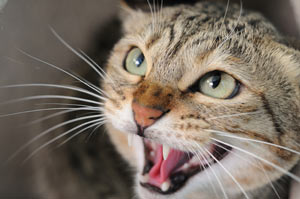Why Do Cats Hiss at People?

Your cat is the sweetest, most affectionate feline ever. Then, suddenly, she's hissing at you! Why do cats hiss? There are a number of reasons your cat might hiss at you or other people. Here are some of the main ones, along with some steps that you can take to try and dissuade the behavior:
Recently Rescued Cats Might Hiss out of Fear
If you've recently rescued a cat and she is hissing at you or others, use the following tips to help her:
- Take it slowly. Be patient. As much as is practical, maintain a calm, stable, and predictable household.
- Provide your kitty with lots of hiding places, https://www.purrfectpost.com/purrfect-scratchers/, perches, and other resources that cats crave.
- Try cat-specific mood enhancers such as Feliway and catnip. Keep in mind that some cats don't respond to catnip, that catnip's effectiveness tends to decrease if it is given too often, and that some cats become aggressive while under the influence of catnip and should have a zone of privacy when given their treat.
Cats May Hiss at You as a Form of Displaced Aggression
Displaced aggression occurs when your cat cannot attack the source of her frustration so she goes after a more convenient target, like you. Use the following tips to dissuade the behavior:
- Redirect your kitty's pent-up aggression through play. For example, move a wand toy in an alluring way to refocus your kitty's attention, or throw a toy down the hall in hopes that she will give chase.
- Make sure your cat has plenty of outlets to let off steam, such as scratching posts, a variety of toys, boxes to explore, etc.
- Resolve the primary source of the aggression. This could be any of a number of things or a combination of them. The most common are other cats or prey animals outside.
Cats Hiss at You Because You're Making Them Do Something They Don't Want to Do
Cats may hiss at people because they don't want to do what's being asked of them. Most commonly, this includes things like getting in the carrier, moving off of a favorite piece of furniture, or getting off the counter. You can decrease this type of hissing by:
- Remaining calm and casual, to convey that there's nothing to worry about. Stay on course.
- Using Feliway when practical.
- Acclimating your kitty to the activity. For example, in the days leading up to when you need to take your cat somewhere in a carrier, leave it in an open place so it's not strange and can be covered in her scent. If possible, go on a few short car rides around the block followed by fun stuff such as treats and play sessions if your kitty's amenable.
- Use thick gloves or oven mitts if necessary to protect your hands.
When Hissing Is Frequent or Impairing Your Cat's or Another Cat's Quality of Life
If your cat's hissing is a new behavior, is frequent, or you can't identify one of the above causes, it could be a sign of a physical ailment, injury, or emotional problem. Consult with your veterinarian to rule out medical causes and possibly to work jointly on identifying emotional and/or environmental causes. Your veterinarian may recommend a cat behaviorist if the underlying problem is complicated, not readily apparent, or requires extended therapy to resolve.
Cats May Hiss at Strangers
Although you may be happy to welcome your favorite uncle, Floyd, or your best friend, Sue, into your home, your cat is more likely to initially see these unfamiliar humans as intruders into her territory and possible threats, especially if she doesn't know the individuals or is not used to people visiting the home. One of her reactions may be to hiss at the invader.
There are some things you can do to make everyone feel better about the encounter:
- Inform your guests. Let them know that, if your cat is wary of them and keeping her distance, they should not try to initiate contact—even eye contact—with her. In fact, they should act nonchalantly toward her, practically ignoring her unless she comes over and stays for more than a quick sniff. If your kitty seems like she's ready to say hello to a guest, the guest can let her sniff an extended finger; this is roughly the equivalent of two cats meeting nose to nose.
- Show your guests how your kitty likes to be petted. Initial petting should be brief and light and restricted to the kitty's favorite areas—and only when she seems receptive. You can also teach your guests how to gently gain your kitty's interest in play by slowly moving a wand toy along the ground, behind furniture corners, and so forth.
- Make sure your kitty has plenty of hiding places, including a secluded room with all her amenities. A pleasantly distracting just-for-cats DVD or a soothing classical CD may also help. If your kitty knows that she has easy access to hideaways, she may feel more emboldened and secure when visitors come over.
- Spray some Feliway or plug in a Feliway diffuser to ease your kitty's tension.
- Remain calm and casual, and as much as possible, stick to your cat's normal routine so she can see that everything's fine and there's nothing to worry about.
- Gradually get your kitty used to visitors. Have low-key, trusted friends—preferably ones who know about cats—come by for casual conversations. Your kitty's guard may very well come down, and before you know it, she may be hanging out with the group. Make sure everyone knows not to rush your cat; let her set the pace in terms of getting friendly with guests.
You may also like the following articles:
Feliway - A Useful Tool to Help Treat Stress in Cats
What Does Catnip Do to Cats? Why Do Cats Like Catnip?
Honeysuckle: An Alternative to Catnip
Territorial Aggression in Cats
Injury or Illness-Related Aggression in Cats
Notice: Ask-a-Vet is an affiliated service for those who wish to speak with a veterinary professional about their pet's specific condition. Initially, a bot will ask questions to determine the general nature of your concern. Then, you will be transferred to a human. There is a charge for the service if you choose to connect to a veterinarian. Ask-a-Vet is not manned by the staff or owners of CatHealth.com, and the advice given should not delay or replace a visit to your veterinarian.





